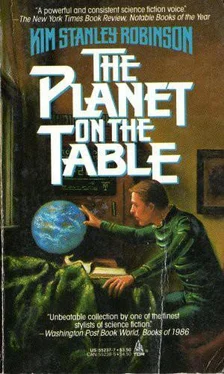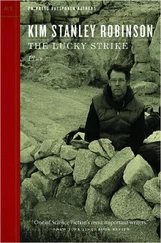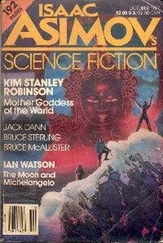He rowed them to the open patch of water that had been the Piazza. Around them stood a few intact rooftops, no taller than the mast of their boat; broken walls of stone or rounded brick; the shadowy suggestion of walls just underwater. It was hard to tell what the street plan of the town would have been. On one side of the Piazza was the cathedral of Santa Maria Assunta, however, still supporting the white campanile that stood square and solid, as if over a living community.
“That here is the church we desire to dive,” Hamada said.
Carlo nodded. The amusement he had felt during the sail was entirety gone. He rowed around the Piazza looking for a flat spot where they could stand and put on the scuba gear. The church outbuildings—it had been an extensive structure—were all underwater. At one point the boat’s keel scraped the ridge of a roof. They rowed down the length of the barnlike nave, looked in the high windows: floored with water. No surprise. One of the small windows in the side of the campanile had been widened with sledgehammers. Directly inside it was the stone staircase and, a few steps up, a stone floor. They hooked the boat to the wall and moved their gear up to the floor. In the dim midday light the stone of the interior was pocked with shadows. It had a rough-hewn look. The citizens of Torcello had built the campanile in a hurry, thinking that the world would end at the millennium, the year 1000. Carlo smiled to think how much longer they had had than that. They climbed the steps of the staircase, up to the sudden sunlight of the bell chamber, to look around; viewed Burano, Venice in the distance… to the north, the shallows of the Lagoon, and the coast of Italy. Beyond that, the black line of clouds was like a wall nearly submerged under the horizon, but it was rising; the Storm would come.
They descended, put on the scuba gear, and flopped into the water beside the campanile. They were above the complex of church buildings, and it was dark. Carlo slowly led the two Japanese back into the Piazza and swam down. The ground was silted, and Carlo was careful not to step on it. His charges saw the great stone chair in the center of the Piazza (it had been called the Throne of Attila, Carlo remembered from one of his moldy books, and no one had known why), and waving to each other they swam to it. One of them made ludicrous attempts to stand on the bottom and walk around in his fins: he threw up clouds of silt. The other joined him. They each sat in the stone chair, columns of bubbles rising from them, and snapped pictures of each other with their underwater cameras. The silt would ruin the shots, Carlo thought. While they cavorted, he wondered sourly what they wanted in the church.
Eventually, Hamada swam up to him and gestured at the church. Behind the mask his eyes were excited. Carlo pumped his fins up and down slowly and led them around to the big entrance at the front. The doors were gone. They swam into the church.
Inside it was dark, and all three of them unhooked their big flashlights and turned them on. Cones of murky water turned to crystal as the beams swept about. The interior of the church was undistinguished, the floor thick with mud. Carlo watched his two customers swim about and let his flashlight beam rove the walls. Some of the underwater windows were still intact, an odd sight. Occasionally the beam caught a column of bubbles, transmuting them to silver.
Quickly enough the Japanese went to the picture at the west end of the nave, a tile mosaic. Taku (Carlo guessed) rubbed the slime off the tiles, vastly improving their color. They had gone to the big one first, the one portraying the Crucifixion, the Resurrection of the Dead, and the Day of Judgement. A busy mural. Carlo swam over to have a better look. But no sooner had the Japanese wiped the wall clean than they were off to the other end of the church, where above the stalls of the apse was another mosaic. Carlo followed.
It didn’t take long to rub this one clean; and when the water had cleared, the three of them floated there, their flashlight beams converged on the picture revealed.
It was the Teotaca Madonna, the God-bearer. She stood against a dull gold background, holding the Child in her arms, staring out at the world with a sad and knowing gaze. Carlo pumped his legs to get above the Japanese, holding his light steady on the Madonna’s face. She looked as though she could see all time: all her child’s short life, all the terror and calamity after that… There were mosaic tears on her cheeks. At the sight of them, Carlo could barely check tears of his own from joining the general wetness on his face. He felt that he had suddenly been transposed to a church on the deepest floor of the ocean, the pressure of his feelings threatened to implode him, he could scarcely hold them off. The water was freezing, he was shivering, sending up a thick, nearly continuous stream of bubbles… and the Madonna watched. With a kick he turned and swam away. Like startled fish his two companions followed him. Carlo led them out of the church into murky light, then up to the surface, to the boat and the window casement.
Fins off, Carlo sat on the staircase and dripped. Taku and Hamada scrambled through the window and joined him. They conversed for a moment in Japanese, clearly excited. Carlo stared at them blackly.
Hamada turned to him. “That here is the picture we desire,” he said. “The Madonna with Child.”
“What?” Carlo cried.
Hamada raised his eyebrows. “We desire taking home that here picture to Japan.”
“But it’s impossible! The picture is made of little tiles stuck to the wall—there’s no way to get them off!”
“Italy government permits.” Taku said, but Hamada silenced him with a gesture.
“Mosaic, yes. We use instruments we take here—water torch. Archaeology method, you understand. Cut blocks out of wall, bricks, number them—construct on new place in Japan. Above water.” He flashed his pearly smile.
“You can’t do that,” Carlo stated, deeply affronted.
“I don’t understand.” Hamada said. But he did. “Italian government permits us that.’
“This isn’t Italy,” Carlo said savagely, and in his anger stood. What good would a Madonna do in Japan, anyway? They weren’t even Christian. “Italy is over there,” he said, in his excitement mistakenly waving to the southeast, no doubt confusing his listeners even more. “This has never been Italy! This is Venice! The Republic!”
“I don’t understand.” He had that phrase down pat. “Italian government has giving permit us.”
“Christ,” Carlo said. After a disgusted pause: “Just how long will this take?”
“Time? We work that afternoon, tomorrow; place the bricks here, go hire Venice barge to carry bricks to Venice—”
“Stay here overnight? I’m not going to stay here over night, God damn it!”
“We bring sleeping bag for you—”
“No!” Carlo was furious. “I’m not staying, you miserable heathen hyenas—” He pulled off his scuba gear.
“I don’t understand.”
Carlo dried off, got dressed. “I’ll let you keep your scuba tanks, and I’ll be back for you tomorrow afternoon, late. Understand? ”
“Yes.” Hamada said, staring at him steadily, without expression. “Bring barge?”
“What?—yes, yes, I’ll bring your barge, you miserable slime-eating catfish. Vultures…“ He went on for a while, getting the boat out of the window.
“Storm coming” Taku said brightly, pointing to the north.
“To hell with you!” Carlo said, pushing off and beginning to row. “Understand?”
He rowed out of Torcello and back onto the Lagoon. Indeed, a storm was coming. He would have to hurry. He put up the sail and pulled the canvas decking back until it covered everything but the seat he was sitting on. The wind was from the north now, strong but fitful. It pulled the sail taut, and the boat bucked over the choppy waves, leaving behind a wake that was bright white against the black of the sky. The clouds were drawing over the sky like a curtain, covering half of it: half black, half colorless blue, and the line of the edge was solid. It resembled that first great storm of 2040. Carlo guessed, that had pulled over Venice like a black wool blanket and dumped water for forty days. And it bad never been the same again, not anywhere in the world…
Читать дальше












